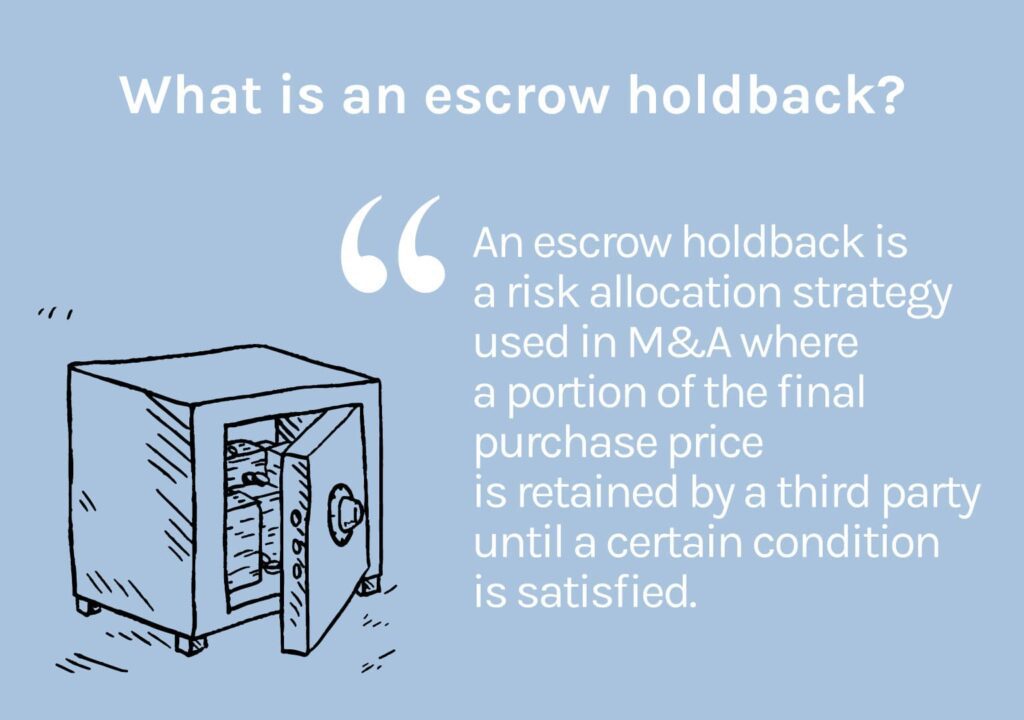An escrow holdback agreement is one of the methods a buyer can use to protect himself after a business transaction. In M&A, when making a business purchase, whether it’s an asset, stock sale, or merger, you always have the risk of encountering surprises after the deal is done. You can still do your due diligence and put all the representations and warranties in your purchase agreement, but what remedies do you have in place when things go wrong?
The best option is not a lawsuit or eating the cost, but to rely on a holdback. In M&A, a holdback is a risk allocation procedure that allows the buyer to retain a specific amount of the purchase price after closing the sale. According to the holdback clause, specified in the purchase agreement, both parties agree that the buyer will preserve this amount for a certain period or until a defined condition is satisfied.
What is an escrow holdback agreement in M&A?
An escrow holdback is when an agreed amount from the business purchase is retained by a third-party agent, which could be a law firm. This is an acceptable practice in a business transaction, as long as the money is set aside for the buyer to recover. It is by an escrow agreement that the buyer can have a self-warranty and insurance after the sale is closed.
The reason buyers use an escrow holdback is that, if the business they bought is not what it promised, they are somehow protected against financial losses. If there is an unforeseen outcome, the purchaser can simply resort to the holdback clause and obtain the agreed amount from the escrow account holder.
In Mergers and Acquisitions, holdback clauses also switch the burden to the seller of having to sue if they want their money from the buyer. This goes back to having a strong purchase agreement with the right covenants, representations, and warranties. The seller will have to analyze the purchase agreement and see if it’s really worth it. The stronger the purchase agreement was, the less likely the seller would sue because their case would be a non-starter.
Holdbacks vs escrow in Mergers and Acquisitions
The difference between a holdback and an escrow is that in a holdback, a specific amount of the purchase price is kept by the buyer as a warranty, while in an escrow agreement, a third party retains this portion.
From the buy-side perspective, a holdback is a preferable practice, since it is the business purchaser who keeps control of the capital. On the other hand, sellers will be reluctant to both holdbacks and escrows, since they want to receive the complete amount of the purchase price once the deal is closed. However, if they must yield, they would rather have a holdback escrow, as this works as protection in case the purchaser is not willing to return the holdback to the seller.
Holdbacks are not to be confused with earnouts. An earnout is a payment or a series of them that must be met according to certain financial milestones related to the company’s performance after the acquisition is closed.
When to use an Escrow Holdback in a business transaction?
In Mergers and Acquisitions, holdbacks can be used when:
- The target (seller) company may owe taxes
- Future profits are difficult to predict
- There is a looming legal dispute with a vendor or employee
- The condition of the target’s assets is questionable
If some tax considerations were disregarded, the escrow can cover this amount.
Benefits of an escrow holdback
An escrow holdback clause in the purchase agreement allows the business buyer to be protected against several uncertainties and also brings the following benefits to the business acquisition:
- Avoid stressful disputes
Going to court, even though you have a reasonable complaint, does not guarantee you’re going to have a successful outcome. Besides, if the court acts in your favor, the money and energy you spent on it are not going to make up for it. An escrow holdback is a way of protecting yourself as a buyer and avoiding issues before they appear, rather than trying to fix them afterward.
- Prevention for price adjustments
It is typical that the final purchase price goes through adjustments. Buyers can draw upon the reserved amount to cover the final costs.
- Evade the need for financing
By deferring a portion of the final payment, purchasers can buy some time to pay without the need for financing.
- Address tax issues
If there were some tax considerations that were disregarded, the escrow can cover this amount.
Usage of escrow provisions
So how much should a buyer negotiate for a holdback clause? In an M&A transaction, a typical amount is around 10% of the deal. But that’s where your due diligence also comes in. If the buyer’s due diligence shows that the seller’s business has a lot of risk or unknowns, the buyer is in a strong position to negotiate a higher holdback clause. Similarly, the average escrow duration is 18 months, but it is the buyer’s responsibility to ensure the escrow is going to be retained enough time for him to discover unforeseen events regarding the business purchase.
At the end of the day, a business purchaser’s goal is to minimize risk. The key is a strategic contract and knowing what tools are available. With a purchase agreement that contains solid holdback clauses, you can continue your acquisition process confidently.
Do you need help buying a business? Call (630) 517-5529 for specialized M&A advisory services.


